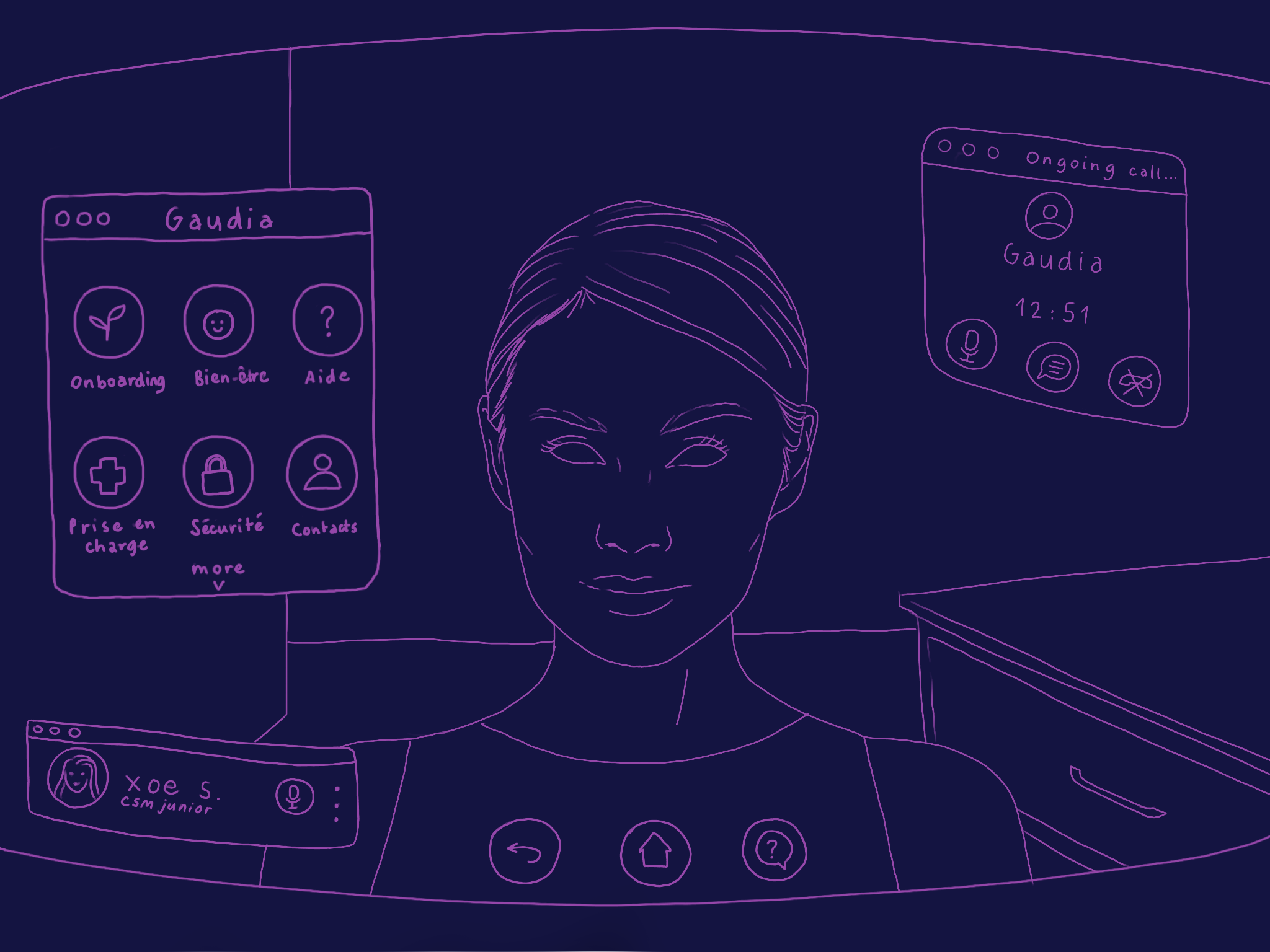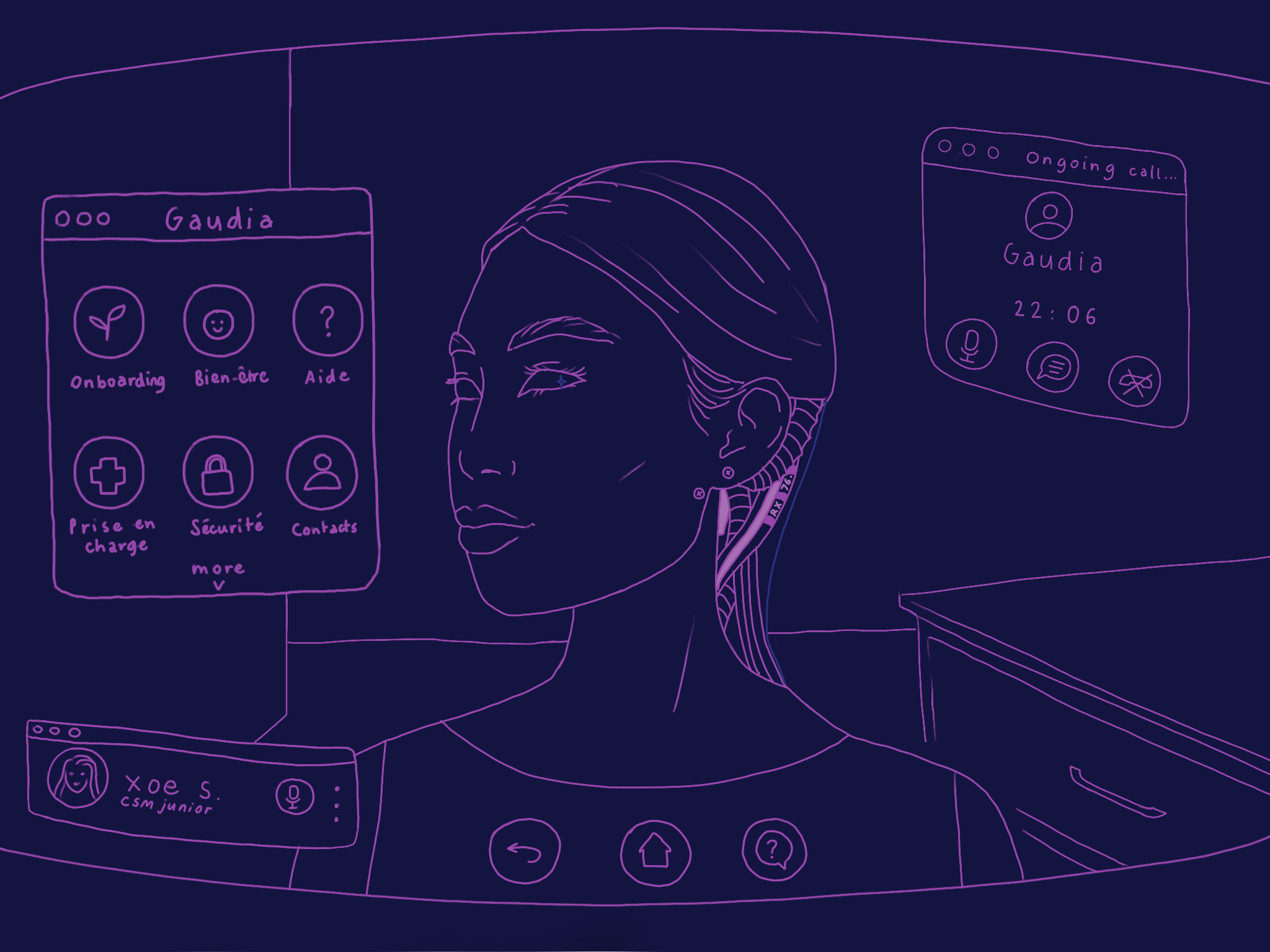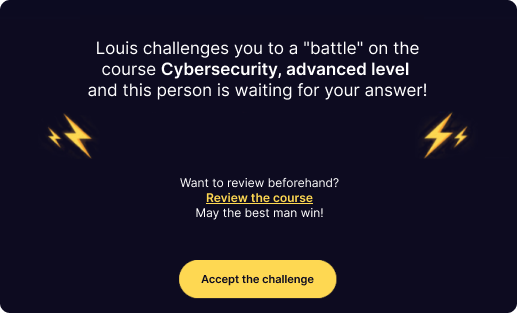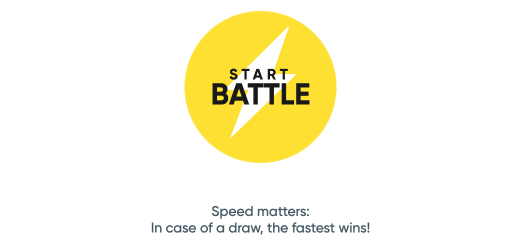Adaptive Learning, ATAWAD, serious Game, entertraining… Are you often lost in the jargon of e-learning and digital technology? Don’t panic, to help you find your way around, we’ve put together a little Digital Learning glossary!
Active Learning
Active learning aims to engage learners in their learning, by involving them in the course activities. Thus, the learner is no longer just a receptacle for information, but an actor in his or her training.
Adaptive Learning
Thanks to the data collected on the platforms, we can draw up learner profiles in order to adapt the learning to each learner. Thus, the training courses are personalised and individualised, to provide the learner with content and methods in accordance with his or her profile and needs. Each learner follows a different path according to the way he or she answers the questions asked, and the learning pace is accelerated or slowed down to suit the learner’s level.
Audio Learning
Audio learning refers to lessons in the form of short narrative podcasts to learn where you want, when you want.
Asynchronous training
Asynchronous time refers to learning times or exchange times that are carried out off-line (with the trainer or between peers). The use of asynchronous communication tools is highly recommended in distance learning as they allow the learner to organise their learning time as they wish.
ATAWAD
This acronym stands for “Any Time, Any Where, Any Device” and illustrates the trend towards flexibility in modern digital learning devices that adapt to the particularities of each learner.
Learners
Learners are people in a learning situation. This is a generic term for all individuals who are learning, whether face-to-face or at a distance.
Blended Learning
Blended learning is an approach that combines face-to-face and distance learning. It allows you to benefit from the different advantages of these complementary solutions.
Cockpit
Cockpit is our course creation and publication tool. It allows our clients to build the architecture of their courses, add their own media (videos, PDF, SCORM, podcasts, web pages), translate the content and subtitle their videos in 23 languages, all in total autonomy.
Custom Courses
Custom courses – as opposed to off-the-shelf courses – are so-called “tailor-made” content. They are specifically created to meet a company’s precise needs. To create your custom content, Coorpacademy provides clients with a course creation tool called Cockpit.
Collaborative Learning
Collaborative learning is about learning with and through others. With the development of e-learning solutions, the collaborative sharing of learning content will encourage learner engagement. For example, on Coorpacademy, each course is accompanied by a forum for leaving opinions, asking questions and adding clarifications.
Completion rate
Completion rate is an indicator of the achievement of a digital learning device. A 100% completion rate means that all learners have followed the entire course; this is different from the success rate, which only judges those who have validated their learning through tests. On the Coorpacademy platforms, the completion rate is on average 84%.
Digital Learning
Digital learning and e-learning are not the same training processes. Digital learning is a digital learning format that allows participants to acquire new skills online, in an autonomous way. The technology allows for many interactions and devices, such as video, quizzes or playful devices (Serious Game, immersive reality) and social learning, which offers learning with and by others.
Educational engineering
Training engineering includes all the steps and actions necessary to implement a training action. From then on, pedagogical engineering amounts to designing a training system. It includes all the stages of analysis and choice of teaching methods to be used. Thus, at Coorpacademy, the educational team is made up of several educational engineers who construct the course content.
Engagement
To boost the effectiveness of a training course, learners must first of all be engaged! This engagement can be encouraged by innovative teaching methods or features on the platform. For example, at Coorpacademy, learners can send each other “battles” between users and thus challenge each other on the subject of their choice.
Entertraining
A contraction of entertaining and learning, entertraining is the term used in e-learning for learning while having fun.
Flipped learning
In flipped learning, the learner learns the theoretical content after having answered the course question. This teaching method, which is specific to Coorpacademy, takes the form of quizzes and enables learners to learn only what they do not already know!
Gamification
Gamification in training is the introduction of activities and/or codes used in games, such as board games or more recently, video games. The learner is faced with an interface like a real video game, using the same codes such as scoring, “lives”, challenges, etc., but with the aim of acquiring “serious” knowledge. On Coorpacademy, many elements are inspired by video games! For example, you start each course with 3 lives and lose a life for each wrong answer.
Hard skills
These are the technical skills that are usually acquired through experience in the workplace.
Some examples are
- Software skills (design, word processing, invoicing…)
- Mastery of a technical language (medical, programming, law…)
- Mastery of a language (English, German, Italian, etc.)
- Mastery of a task (writing, community management, etc.)
- Mastery of a field (mathematics, physics, accounting, marketing…)
Immersive Learning
Immersive learning involves immersing the learner in a virtual environment, often through tools such as goggles, headphones or screens, allowing the simulation of a given situation.
Individualised training
Individualised training refers to the possibility of responding specifically to the needs of learners through intelligent e-learning platforms. Thus, each learning path is individualised, i.e. it corresponds to the learner’s profile.
Learning experience
The learning experience refers to how the learners – the user – feel during their experience on the platform. Improving the learning experience allows for better engagement on their part.
Learning analytics
Learning analytics are all the data collected on the learning platform to analyse the behaviour of learners – courses taken, completion rates, number of questions answered, etc. – in order to profile them. – in order to establish their profile.
Learning in the flow of work
Learning in the flow of work is about having quick and easy access to an answer or short piece of learning content while you are working. The term was coined by Josh Bersin. Research shows that learning on the job boosts productivity, increases engagement with formal learning and improves knowledge retention.
Learning Management System (LMS)
The LMS is a software application for the “management” of training devices. It is a training platform, i.e. web-based software dedicated to the storage, organisation and distribution of educational content, with a view to delivering targeted learning to a community of learners.
Learning organisation
A learning organisation is an organisation that has a culture, behaviours and processes in place that support the continuous development of everyone’s skills.
MCQs, Quizzes, QCUs
Quizzes are questionnaires used to check the acquisition of knowledge and skills. Different types of quizzes exist, of which the most commonly used are multiple-choice quizzes (MCQs) in which several correct solutions must be chosen to validate the question or single-choice quizzes (SCQs).
Microlearning
Microlearning is a training or learning modality in short sequences of 30 seconds to 5 minutes, using text, images and sound. These microlearning courses are often focused on a specific notion with a defined objective.
Mobile Learning
Mobile learning consists of introducing learning activities that are perfectly adapted to the small screen sizes of smartphones or tablets. At Coorpacademy, 30% of our training is done on mobile. Our application is available on all media, thus enabling the learner to learn wherever they want, whenever they want.
MOOC
A MOOC is an online course that is open – registration is free – and can support a large number of registrants (massive). With MOOCs, the learner is free to organise himself or herself as he or she wishes, except for synchronous exchange sessions or work in sub-groups.
Multi-support
When a digital training course is described as “multi-support” it means that it adapts to all types of media, i.e. to different screen sizes, from the computer to the smartphone. The technique used to adapt is directly linked to the programmed code and is called “responsive”.
Off-the-shelf courses
Off-the-shelf courses are training content that has already been produced. They are generally courses on cross-cutting subjects such as office automation or languages. In theory, they are opposed to so-called “customised” content, i.e. content created specifically to meet a company’s precise needs. In the case of Coorpacademy, off-the-shelf content is created by our educational engineers or in collaboration with our more than 60 partner publishers.
Training module
A training module is an autonomous unit of a training action, i.e. it meets a set of pedagogical objectives that must be addressed together. Several modules can form a training pathway.
Soft skills
Soft skills refer to human or relational qualities, which are generally developed through practice. The particularity of soft skills is their transversality: they are not linked to a particular profession or technical context. This is what distinguishes them from hard skills.
These qualities are, for example
- communication skills
- initiative
- team spirit
- ability to adapt
- creativity…
These skills are crucial, and it is often these that make the implementation of practical skills optimal.
SCORM
SCORM stands for Sharable Content Object Reference Model. It is a standard intended mainly for LMS (Learning Management System) platforms for distance learning. The creation of SCORM compliant standard modules allows them to be imported or exported from one LMS platform to another for reuse. These contents (Content Object) are thus sharable, allowing the interoperability of the various LMS platforms.
Serious Game
The Serious Game is an anglicism designating the integration of educational elements in a game universe. The aim is to reproduce the interface of a real game, using its codes and principles. For example, at Coorpacademy, the course inspired by the game Cluedo puts the learner in the shoes of Colonel Mustard, who must use his critical mind to find out who killed Mr. Boddy!
Social Learning
Social learning refers to the exchange of educational content between peers. It allows, thanks to synchronous tools (chat, instant messaging, audio and video conferencing) or asynchronous tools (wiki, social network), to exchange with peers and share additional information.
Story Learning
In a marketing context, storytelling is most often the use of narrative in advertising communication. It consists of using a story rather than the classic brand or product arguments. The storytelling technique is normally used to capture attention, arouse emotion, work on the brand personality and, according to some studies, promote memorization.





 At Coorpacademy, to encourage collaborative learning, we encourage learners to challenge each other and test their new skills in a very interactive and fun way. That of the battles. This element of play on the platform in duel question mode allows each learner to challenge the person of their choice on the course of their choice! The learner who answers the most questions correctly – or the fastest in case of a tie – wins the Battle, 5 bonus points, and a better knowledge of the course.
At Coorpacademy, to encourage collaborative learning, we encourage learners to challenge each other and test their new skills in a very interactive and fun way. That of the battles. This element of play on the platform in duel question mode allows each learner to challenge the person of their choice on the course of their choice! The learner who answers the most questions correctly – or the fastest in case of a tie – wins the Battle, 5 bonus points, and a better knowledge of the course.